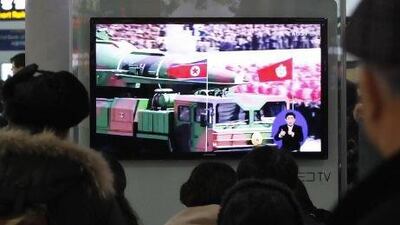BEIJING //North Korea's sole major ally, China, urged "all relevant parties" to show restraint after Pyongyang said it planned to carry out a third nuclear test and more rocket launches aimed at the United States.
"All relevant parties should refrain from action that might escalate the situation in the region," the foreign ministry spokesman, Hong Lei, said yesterday in Beijing.
China hoped they would "stay calm, be discreet in words and deeds and look at the long-term interest and push for the resumption of the six-party talks", he said.
He was referring to long-stalled negotiations over the North's nuclear programme between China, the United States, North Korea, South Korea, Japan and Russia.
The comments came after the North hurled fresh invective at its US-led foes in a statement from its National Defence Commission, without specifying when the atomic test - part of an "upcoming all-out action" - might be carried out.
"We do not hide that the various satellites and long-range rockets we will continue to launch, as well as the high-level nuclear test we will proceed with, are aimed at our archenemy the United States," the commission said.
China is the North's leading energy supplier and trade partner, but Beijing backed a UN Security Council resolution this week that condemned Pyongyang's rocket launch last month and imposed expanded sanctions.
Shi Yinhong, professor of international relations at Beijing's Renmin University, said that China had very little influence over the North Korean leadership when it came to the subject of its military build-up.
"Generally, nuclear tests and missile launching is for domestic political and ideological requirements. These are not only difficult for China to influence, but also the outside world," he said.
Beijing has repeatedly called for restraint from "relevant parties", and argued that pushing Pyongyang into a corner could provoke a reaction that would seriously destabilise the Korean peninsula and the wider region.
The Security Council resolution was the product of long negotiations between China and the United States, envoys said, with Beijing looking to shield Pyongyang from harsher measures.
Mr Shi said China's backing for the resolution - it has a veto at the Security Council - was a signal it wants closer ties to Washington as it seeks a rapprochement amid a simmering territorial row with Japan.
Last week the US secretary of state, Hillary Clinton, issued a veiled warning to Beijing not to challenge Japan's control of the East China Sea islands that Tokyo calls Senkaku, but which are known as Diaoyu in China.
"China wants to show a major concession to the US over North Korea, to influence US actions with regards to Sino-Japanese confrontation," Mr Shi said.
"Otherwise you cannot explain why China suddenly changed its previous behaviour. It wants to influence the American position over Diaoyu."

